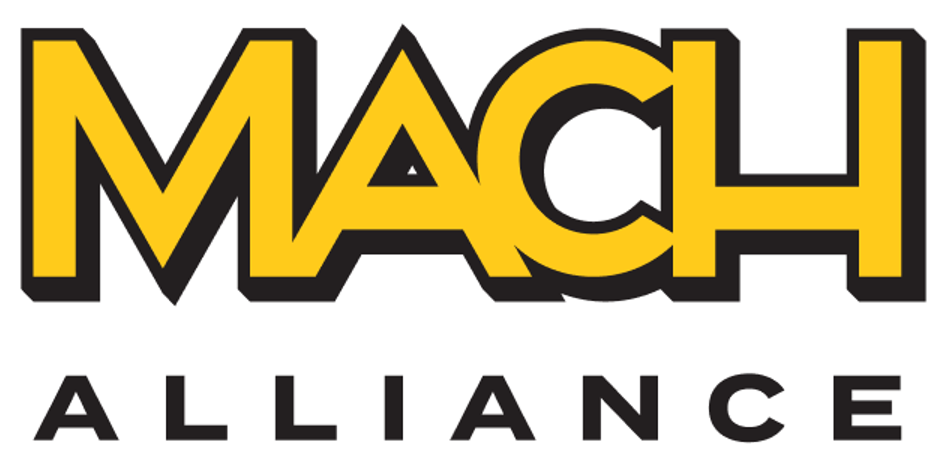A New Game for Interoperability? Here’s Why the MACH Alliance’s Open Data Model is a Winner

The industry group – which focuses on future-proofing enterprise technology – just announced the launch of its new initiative, aimed at resolving the persistent interoperability and integration challenges plaguing brands, SIs, and software vendors.
I first heard the term “MCP” as a tech-obsessed, Commodore-64-toting 8-year-old. It landed during the epic video game movie Tron, where it was used as an off-hand contraction for the nefarious “Master Control Program."
As the story's digital antagonist, the MCP exhibited the worst traits of artificial intelligence, projecting an unscrupulous, destructive, self-serving agenda. Kind of like that terrible neighbor who’s always on a power trip at your HOA meeting – but with lasers.
Life is sometimes stranger than fiction, and this acronym has now materialized on the grid as a real-life TLA with an AI inference. Hopefully, the similarities to that other MCP end here, but I’m keeping my light cycle on standby.
This newer permutation of MCP – Model Context Protocol – is an open standard for governing how applications provide context to LLMs. Much like USB-C provides a standardized way to connect devices to different accessories, MCP does the same to connect AI models to different data sources and tools.
Why is this important? Because MCP has become a critical piece of the agentic pie, enabling you to build agents and workflows on top of LLMs – which often need to integrate with various data sources and tools. MCP can provide access to pre-built integrations that ease the connection process, including lightweight programs and hosts like IDEs.
All of this, as Tron might say, is about interoperability. And while the digital frontier is very much focused on the evolution of agents, we’re still wrestling with integration complexities in the here and now. This is where data models can be key assets, helping brands, system integrators, and vendors to present products, orders, inventory, and other commerce-related data.
But building a data model from scratch is tough. And by definition, each from-scratch data model is unique. That’s why the MACH Alliance has introduced a new Open Data Model Initiative, which aims to solve the lingering interoperability issues plaguing enterprises, SIs, and ISVs.
The industry group – which is focused on future-proofing enterprise technology through open, connected, and composable digital experiences – just announced the launch of the program. It coincides with its annual live event, “The Composable Conference,” which is being held in Chicago this week.
Led by the Alliance’s Interoperability Task Force, the Initiative will provide a set of reusable data model recipes and reference structures. These components will be extensible across critical technology domains, such as commerce, product information management (PIM), and orchestration.
These patterns aren’t a set of draconian standards. In fact, they’re designed to be lightweight, adaptable, and built for real-world applications. This addresses the strategic concerns of businesses as they seek out more composable, interoperable solutions to help them navigate a rapidly changing digital landscape.
"Interoperability has been a primary focus for the MACH Alliance," said Adam Peter Nielsen, CTO of Novicell and MACH Alliance Interoperability Lead. “With a shared data model recipe, we can make tangible progress toward seamless integration and strategic agility across diverse technologies.”
Broadening the composable roadmap
According to the Alliance, its Open Data Model will be made publicly available under an open-source license on GitHub, helping to ensure transparency, accessibility, and broad community engagement.
But that’s only the first step. The plan is to maintain innovation and maturity through the MACH Alliance Interoperability Working Group, which will actively enhance and expand the model. The goal is to deliver a solution that’s ready for full member consumption by the end of Q2 2025.
To accelerate go-to-market readiness, the MACH Alliance is working with several MACH Certified Vendors that have provided sample material. The list includes Conscia, Alokai, commercetools, Bluestone PIM, Occtoo, and Pipe17 – which offered its open, comprehensive, canonical data model as a starting point.
“We built our data model over five years,” said Kelly Goetsch, COO of Pipe 17 and former MACH Alliance president and chair. “It sits at the heart of our solution, has been rigorously tested in real-world use, continuously refined, and has always been open source from day one. We’re thrilled to contribute it to the MACH Alliance, further empowering the commerce ecosystem to innovate and scale faster.”
Also leading the initiative are a set of MACH Certified System Integrators, including Apply Digital, Novicell, and Valtech – buoyed by the hyperscaling support of MACH Certified Enabler AWS.
Giving merchants, SIs, and vendors a MACH multiplier
The new Open Data Model is poised to provide significant benefits across the MACH ecosystem. From vendor-neutral patterns for seamless interoperability to reference structures for vertical markets like manufacturing, the initiative will provide a “springboard” for new projects or legacy – all with a dedicated focus on transparency.
First, merchants will have the ability to adopt this data model as their own – and effortlessly connect their existing homegrown systems with MACH-compliant solutions.
Additionally, systems Integrators and agencies will be able to build repeatable solutions, enhance their overall efficiency, and speed up MACH implementations. This will accelerate their time to deliver value to merchants.
As for MACH Alliance vendors, the initiative will provide immediate access to a robust foundational data model, dramatically reducing initial development effort and enhancing a more seamless data flow between partner solutions.
What about AI (and that MCP stuff)?
Of course, there’s the future runway to agentic AI that I mentioned, which is wholly dependent on data. As the Alliance posits, without a shared data model, enterprises will continue to face fragmented, siloed data environments that limit AI’s ability to make accurate decisions and deliver tangible business value.
By establishing an open, vendor-neutral data model, the MACH Alliance is laying the groundwork for the use of agentic AI and supporting Anthropic’s MCP-powered agents. This is helping to connect AI assistants to the systems where data lives, including content repositories, business tools, and development environments. Its goal is to help frontier models produce better, more relevant responses.
"Enterprises demand solutions that work together,” said Bob Howland, Chairperson of the MACH Alliance. “By standardizing an Open Data Model, we dramatically simplify integrations. Vendors adopting the Open Data Model will find faster implementation cycles and significantly reduced complexity – enabling true interoperability that powers digital innovation."
Why it matters
Spoiler alert: At the end of Tron, the computer system is once again free, giving the personified programs the ability to move about and, presumably, connect with other programs to build cool things.
There’s something beautiful about this idea of seamlessly interoperating. There’s no question that security and governance are top of mind in such paradigms, and we’re a long way from easy. Still, interoperability can be made easier – better, even – with the introduction of more predictable standards.
From the beginning, the concept of “openness” has been core to the MACH Alliance, making it a solid foundation for providing a common, open source data model that’s been proven. Based on the Alliance’s plans, it sounds like this model will continue to benefit from ongoing innovation and be well-supported in the future.
The flexibility and extensibility of this model are also key factors. By enabling off-the-shelf access to its merchant, SI, and ISV ecosystems, the Alliance is helping to ensure that the model is instantly adoptable and supported by its members. There’s also an open invitation for experts and practitioners to help shape the model for future use cases.
The market is always yearning for standards, and with the rapid acceleration of AI – specifically with MCP-powered model agents – having more predictable and reliable pathways to integrate should reduce the friction for building the next wave of agentic applications. Even the most advanced models are limited by their isolation from data, walled in behind silos and legacy systems. This is why this investment in an open data model is an ambitious and positive step forward.
Will this solve every integration problem on the light cycle grid? Not likely. But it's a start. It might also unlock more potential for additional industry applications, something the organization has struggled with as it endeavors to expand and export its relevance to other industries.
To that end, the MACH Alliance is also undergoing its own evolution (including its messaging). The Open Data Model might be the first page of its next chapter as it seeks to enrich its foundational mission and further support the market. With composable continuing to make gains, many are asking what's ahead, and this initiative is a glimpse of its vision for an open, AI-enabled ecosystem.
You can learn more about the Open Data Model initiative and even contribute to the project at https://machalliance.org/open-data-model-initiative
Upcoming Events

The Composable Conference 2025
April 22-24 – Chicago, USA
Experience the future of composable and MACH principles in “The Windy City” and dive even deeper into the innovative world of MACH architecture and its benefits for your business. Building on the momentum of MACH THREE, this conference will provide your teams with the expert, impartial guidance needed to craft a winning transformation strategy and leverage the latest advancements in automation and Al to maximize efficiency and drive your organization forward. This event is ideal for executives, business leaders, technologists, and everyone in between who is looking to harness the power of composable. Secure your spot today.

CMS Summit 25
May 13-14, 2025 – Frankfurt, Germany
Don't miss the first European edition of our prestigious international conference dedicated to the global content management community! CMS Summit 25 will bring together top-notch speakers, our renowned learning format, and engaging social events. Hear from leading practitioners like Deutsche Bahn, Dr. Oetker, and more – and join customers, agencies, and CMS vendors as we discuss current trends and what's ahead for the content and digital experience fields. Connect and network at the only vendor-neutral, in-person conference focused on CMS. Space is limited for this exclusive event, so book your seats today.

CMS Connect 25
August 5-6, 2025 – Montreal, Canada
We are delighted to present the second annual summer edition of our signature global conference dedicated to the content management community! CMS Connect will be held again in beautiful Montreal, Canada, and feature a unique blend of masterclasses, insightful talks, interactive discussions, impactful learning sessions, and authentic networking opportunities. Join vendors, agencies, and customers from across our industry as we engage and collaborate around the future of content management – and hear from the top thought leaders at the only vendor-neutral, in-person conference exclusively focused on CMS. Space is limited for this event, so book your seats today.